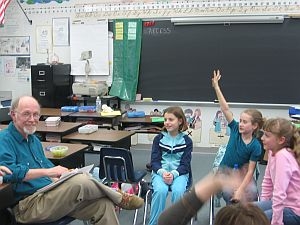
(Host) At their best, folk ballads are a form of storytelling.
They preserve history and teach us lessons.
Most of the ballads we’re familiar with are from long ago, but with the help of one Vermont songwriter, students are learning that the ballad form is still a great way to capture history and tell a story.
VPR’s Steve Zind reports.
(Zind) In contemporary music, a ballad is a song that’s slow and sentimental.
But traditional ballads have another definition.
(Assisi) A song that’s telling a story, and a very meaningful story with a lesson that has to be learned.
(Zind) That’s something 12 year old Dana Assisi (ah-see-see) probably couldn’t have put her finger on just a few weeks ago. But these days she’s listening for elements of ballads in the hip hop and country songs she likes and, along with a dozen or so students at the Swanton Elementary School she’s learning the art of writing ballads.
Folksinger Pete Sutherland is leading the workshops.
Sutherland says the kids have no problem relating to the timeless lessons in these old songs.
(Sutherland) "I see them responding instantly to the power of the music right away. I do unaccompanied songs because they’re so unusual in this day and age that they kind of startle people into attention."
(Zind) Ballads can be spooky or funny, unusual or everyday, straightforward or confounding. They often have a clear moral. For example there’s one about a young man who was too lazy to farm and cook for himself…a quality not lost on the woman he wanted to marry.
(Sutherland singing ballad) "How can you ask me for to wed/ if you won’t bake your own corn bread/single I am and will remain/ for a lazy man I’ll not maintain/ A lazy man I’ll not maintain."
(Zind) Sutherland starts each workshop session by playing the students examples of folk ballads. Then they talk about them.
(Sutherland ballad3) "What did she think?"
(student) "If you can’t cook your own corn bread, why should I marry you?"
(Sutherland) "Why should I marry you, you lazy guy."
(student) If you can’t cook your own meals…"
(Sutherland) "Right, exactly."
(Zind) The workshops are part of the statewide Young Writers Project and the goal is to have students collaborate to write their own ballad to mark the quadricentennial of Lake Champlain. They’ve decided to draw from Swanton’s history for the ballad’s lyrics. One of the students, Nathanial LeFebve, is fairly new to town.
(Zind) "Did you learn anything about Swanton while you were doing this?"
(LeFebvre) "I learned a lot. I never knew that there was actually a turkey farm."
(Zind) The students discovered that Swanton was once the turkey capitol of the country. The largest turkey farm was owned by the Tabor family.
This historical tidbit, along with the fact that Swanton was once given a pair of swans by the Queen of England, not to mention all the waterfowl at the nearby Missisiquoi National Wildlife Refuge, led to the idea that birds should be the central characters in the song.
(Sutherland) "So here’s how I summarized, and we did so much work on this: ‘Peep said the poults out at Tabor’s turkey farm. There were 40 thousand of us there in one enormous farm.
(Zind) Session by session, Sutherland builds a ballad from the students’ ideas, which they’re encouraged to put down in notebooks and online.
(Sutherland) "Okay, how about this line here: ‘You studied your geography your local history, too.’ Is that something we want to say?"
(student) "Younger kids won’t know what geography is."
(student) "We can look in the thesaurus to see if we can find a better word."
(Zind) The students have lots of ideas and Sutherland manages to incorporate many of them – even a line about the seagulls trolling for French fries at a local eatery.
Sutherland hopes the process shows them there’s nothing magical about songwriting; it’s just a matter of knowing the rules and putting in the time.
(Sutherland) " I think it’s a lesson in the work that goes into something. To give them a bird’s eye view into how the writer of the song envisions every step of the way the choice of language and the choice of music and then the layers that go into it."
(Zind) That’s a lesson not lost on Nathanial who says he’s learned that even the simplest seeming songs take work to create.
(LeFebvre) "To ‘Row Row Your Boat’ someone had to write the ballad to it. Ballads aren’t that easy to write sometimes."
(Zind) "What makes them hard to write?
(LeFebvre) You have to think about it and it might take a couple years or months."
(Zind) Jenna Bourdeau is another budding ballad writer. She says she likes the idea that ballads are a way of telling stories in rhyme. She’s sure that the workshops will produce a memorable song – in the best ballad tradition.
(Bourdeau) "I think it’s going to turn out really well, because we’re being really cooperative."
(Zind) The students will perform the finished piece in a concert at the site of what once was Swanton’s biggest turkey farm.
For VPR news, I’m Steve Zind.
(Host) The performance of the students’ ballad, called "A Bird’s Eye View" will take place Monday, May 4th at 4:30 at the Tabor House in Swanton.